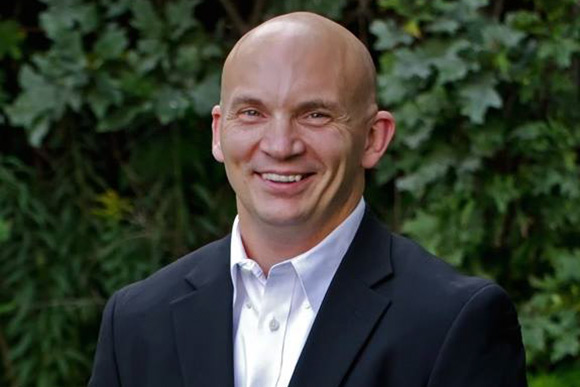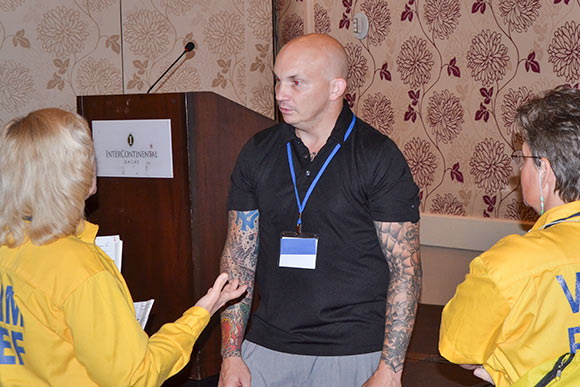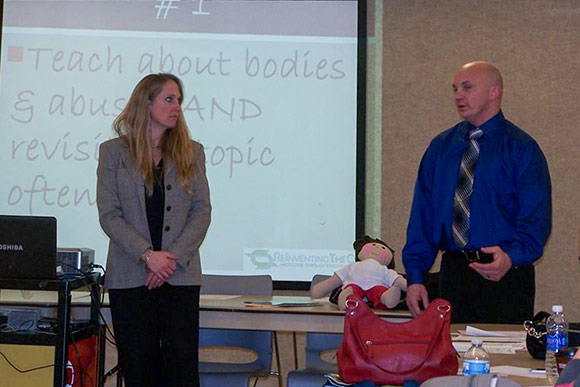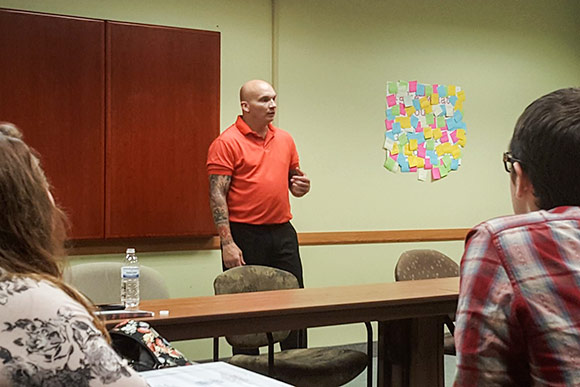This is Mikey from the Bronx
Mike Pistorino has come to tell a class of future advocates for rape and sexual assault survivors how he forged happiness out of horror.
Seven women and one man, all 20-somethings, plus several trainers and staff of Townhall II, Kent’s wellness center for people recovering from addiction or violence, recently gathered in an upstairs classroom at the N. Water Street facility to hear his terrifying tale of being molested and repeatedly raped as a child.
A vice president of sales for Concrete Fastening Systems, Inc. in Cleveland, Pistorino spends a significant amount of his free time speaking to public groups about child molestation and rape to spread awareness of the issue, but also to reach people who may have been assaulted at any age.
His hope is to get them to step forward and seek counseling as he did, so that they can free themselves of the burden of guilt, shame and rage and move forward with their lives.
At each of the more than 100 events where Pistorino has spoken over the past few years, he has had at least one person talk to him afterward and disclose an incident. Since he is not a therapist, Pistorino stipulates in all of his speaking contracts that a professional counselor be present who he can connect people to.
According to the statistics Pistorino cites and those used by the Cleveland Rape Crisis Center (CRCC), where he received counseling and now serves on their public speakers bureau, one in three girls and one in seven boys will be sexually abused at some point in their childhood.
“No one knows the exact incidence of child molestation, rape or male rape in Cleveland and Northeast Ohio because an overwhelming majority of it is undetected or under-reported,” says Sondra Miller, president and CEO of the CRCC.
Miller adds that if someone suspects that a child is being harmed, they have an obligation to report it to the local police department or call Cuyahoga County Children and Family Services (216-696-KIDS). CRCC also offers a 24-hour anonymous support hotline, (216-619-6192).
“We offer advocacy and counseling services to survivors of sexual abuse in the immediate aftermath of disclosing abuse or years or decades after the trauma occurred,” Miller says.
According to a Centers for Disease Control National Intimate Partner and Sexual Violence Survey, one in 71 men in Ohio have been raped in their lifetime. The number of men that call CRCC for help has ballooned in recent years, Miller informs, and they offer a group exclusively for male survivors of rape and sexual abuse among their many support groups.
Few, however, have stories as harrowing as Pistorino’s. The son of a “drunk mom who owned a bar,” he ran amok on the streets of the Bronx as a child. At the age of five he stumbled into a sordid world at a neighbor’s house, where young adults convened to “drink, smoke, do drugs and play grab ass.”
One of the men befriended him, pretending to be his protector, and soon afterward started raping him. Today, Pistorino estimates that he was assaulted between 600 and 700 times during a six-year period.
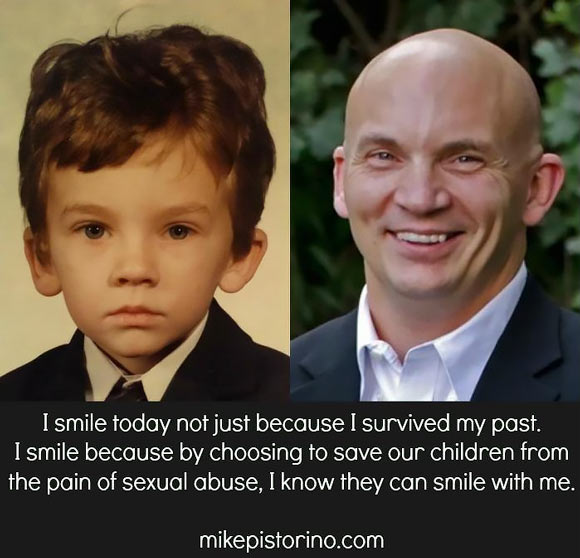
When Pistorino was 12, three important things happened: One, he discovered he could hit kids as hard as he wanted while playing organized football at school. Two, for $10, he could score cocaine that made him feel better than he usually did each day while waiting to be raped. Three, His rapist was stabbed to death in a drug deal gone bad.
Although the rapes stopped, the damage was done. Pistorino fell into 16 years of violent crime and addiction, stealing anything that wasn’t locked down, selling drugs and constantly getting in fights -- all while living in one of two places: jail or the street.
Typical of Pistorino's speaking engagements, the room remains silent during these revelations. However, his effectiveness as a public speaker lies in the balance he provides. This night, his opening draws a laugh: “I’m from New Yawk. That’s why I tawk normal. I don’t tawk funny like you people.”
He follows with a candid recounting of his ordeal so that the terrors victims of child molesters endure are clear, as are the unhappy consequences.
“You guys are going to see that in a lot of your survivor clients,” Pistorino relates to the trainees. “We think we’re stuffing this embarrassment, guilt and rage inside ourselves, but it comes out in other ways, whether we’re overeating or doing drugs or acting out sexually, we’re going to be doing something wrong.”
Pistorino relates how his predilection for drugs and crime persisted for many years until he finally hit bottom.
“One day when I was 29, after all these years of suffering, shame and guilt and believing that I’m a piece of crap, because everyone always told me I’m a piece of crap,” Pisorino tells the enrapt trainees, “I woke up on the 6 train, where I’d spent so many nights that the conductor would wake me when we turned around in Brooklyn. I was freezing, my socks were wet, I was miserable and crying, didn’t have no more drugs, so I moved into a rehab in New York called Daytop Village.”
Pistorino relapsed a few times, but finally got clean. Then he met a young Cleveland woman named Cynthia on the subway. Shortly after, he took a bus from New York to Cleveland and called her.
After a brief hesitation, Cynthia picked him up at the bus station, and they were later wed. He found a job at Concrete Fastening Systems. He felt great but still wasn’t comfortable in his skin.
The turning point, Pistorino emphasizes, was finding a pleasant, compassionate advocate – just like his audience members – on the Cleveland Rape Crisis Center Hotline. The woman he spoke to listened patiently the first two times that he called and quickly hung up, believing that they wouldn’t help a man who had been raped, and the third time when he finally agreed to come in for counseling.
Indicating himself as a success story, he tells the trainees in his buoyant Bronxese: “This is what can happen. I’m happy as hell, and I was a miserable, criminal prick. Now, I’m like a freakin’ ray of sunshine over here!”
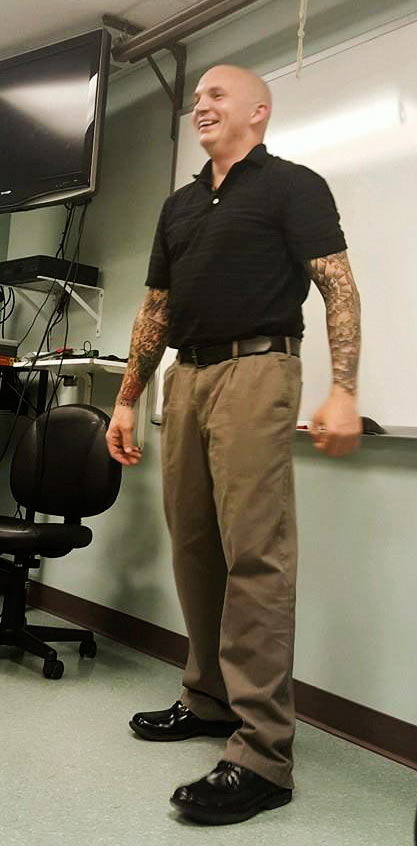
He reminds them that they will get people who relapse and continue to put themselves in bad situations. “But every once in a while, you’re going to get somebody like me who’s entire life changes,” he concludes. “Because of beautiful people like you, I’m a better father, a business owner, a good husband, a good friend, and I’m happy.”
After answering a few questions, Pistorino heads home to Bay Village and the loves of his life: Cynthia and their three little girls. At one point in his talk, he reveals: “My biggest fear was, if I am not drinking and I’m not fighting, what am I going to do with all my time? Now, my time is spent dancing in my yard, wearing princess crowns, singing ‘Skinny Marinky Dinky Dink’ with my girls.”
Currently, Pistorino serves on the board of Reinventing the Cycle for school-based prevention programs; runs with the Girls with Sole for at-risk girls, and assists several other related organizations.
Additionally, Pistorino consults with the police and FBI about how sexual predators behave, and he speaks in prisons to encourage anyone who was assaulted to seek counseling. He is beginning to emerge on the national stage as an advocate and beacon of hope for all who have suffered as he did.
Recently, Pistorino's talk, “Fit to Thrive: Utilizing Exercise to Help Survivors of Sexual Abuse Recover" was one of the most popular presentations at the annual convention of the National Organization for Victim Assistance in Dallas.
Becky Perkins, communications coordinator for the Ohio Alliance to End Sexual Violence, which provides training and technical assistance to all rape crisis centers in the state., says Pistorino’s presentations vary from other survivor accounts in the way he leaves his audience feeling: “Mike’s so happy and joyful to be alive and doing well that it’s just infectious," she says. "He makes you want to take on the world and kick some ass.”
An imposing character when he wants to be, Pistorino is bald, stands just under 5’10”, is cut like an MMA fighter, and covered in colorful prison tattoos from his shoulders down. He runs marathons and has raised tens of thousands of dollars for his favored organizations. He has little trouble finding sponsors.
“I’ve realized that I’m a gifted communicator who can make people do what I want them to do,” he quips.
“You look at him, and he’s this tough guy, but really he’s a big marshmallow down deep,” counters his friend Cathy Dubois, founder of Reinventing the Cycle. “He’s one of the most passionate people I know, and I don’t know how he sleeps with everything he does to help people.” Pistorino often accompanies Dubois at PTA meetings throughout the state to advocate for her prevention program that she hopes to have in all 88 counties by the end of the year. He’s happy to inform them that they and their principal are fostering child molestation if they ignore this program.
“He has no fear,” declares Miller. “He can say things that even we can’t say at the CRCC to push the envelope and get the community to think about how sexual assault impacts people, families and society.”
Ultimately, Pistorino knows the children and organizations he speaks for need him on their side. “Sondra, Cathy or Becky are such caring, loving, welcoming people, sometimes they need a little muscle,” says the engaging enforcer. “We’re fighting a really mean, deceptive, horrible enemy, so sometimes I gotta be a bully for the good guys.”
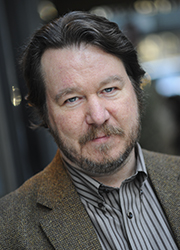
About the Author: Christopher Johnston
Christopher Johnston has published more than 3,000 articles in publications such as American Theatre, Christian Science Monitor, Credit.com, History Magazine, The Plain Dealer, Progressive Architecture, Scientific American and Time.com. He was a stringer for The New York Times for eight years. He served as a contributing editor for Inside Business for more than six years, and he was a contributing editor for Cleveland Enterprise for more than ten years. He teaches playwriting and creative nonfiction workshops at

